On April 4, the Japanese Cultural Collective hosted an “Anime 101” night in The Forum. The goal of the event was to give those who didn’t necessarily have experience with anime some basic knowledge about the medium. They also hoped to cultivate a love for anime by helping beginners get a good grasp on concepts that might have otherwise seemed alienating or overwhelming. Anime is a vastly complex medium. Sometimes just jumping into it is a bit much. A range of people attended the event, from anime experts to complete beginners. JCC officer Chantelle Mitchell opened with a brief presentation to give attendees a little background on the subject. When putting the presentation together, Mitchell thought back to her own first experiences with the medium. “When I first started anime, I was like, ‘Whoa. This is weird.,’ ” she says. With that in mind, the presentation focussed on the strange nuances that don’t always make sense to someone just starting to watch anime. One of the big focusses was on anime lingo as well as the cliches found in anime TV shows and movies, many of which can be found on Crunchyroll.com While there were a lot of attendees who already knew much of this information, Mitchell took care to explain each of the concepts for those who hadn’t been watching for that long. With each slide, there was a lot of laughter over how absurd certain parts of anime might seem to an outside viewer, such as the many over the top facial and body expressions characters make. After the presentation, attendees enjoyed a viewing of the first four episodes of the half hour comedy anime “Ouran High School Host Club.” This was a huge attendance draw to the event. “Ouran” is a widely...
Q/A w/ DeVillier and Sanders
posted by Charlotte Martinez
In this interview with David DeVillier, assistant director of campus life, and Terrance Sanders, Student Life operations manager, we hear from two of the friendliest faces on campus.
String of Pearls Preview
posted by Andrew Koss
Alyssa Vogel says String of Pearls is a “woman-empowering show. You will know a woman in the play, whether it’s your mother, your grandmother or someone else.” String of Pearls premieres April 10 and 11 at 7 p.m. and concludes on April 12 at 2 p.m.
Expired Milk
posted by admin
The Awkward Shelby Comic is created by SFUAD studio art major Shelby Criswell. For more of Criswell’s work, check out the Awkward Shelby Comic series and her Tumblr.
Coming Attractions
posted by Charlotte Martinez
Showcasing the best in classical, independent and foreign cinema, The Screen cinematheque at Santa Fe University of Art and Design presents new releases, special cinema events and performances all day every day. Here’s what’s showing April 10-16, 2015.
Manhattan Job Fair
posted by Serafima Fedorova
At SFUAD’s “Manhattan” job fair, students had the opportunity to learn from professionals about what it will take to move ahead in their careers.
The Credibility of Fan Fiction
posted by Charli Renken
Fan fiction is defined as fiction written by fans of TV series, movies or books that includes the characters of the original stories. Widely popular online, fan fiction is an area in which it seems like just about every fan has dabbled at least once or twice. Fan fiction also is a integral part of fandom communities (world wide groups of fans), and has been around since the popularization of it in 1960’s in Star Trek fanzines such as Spockanalia (1967.) Fan fiction certainly has its fans and practitioners in the Creative Writing and Literature Department, as was demonstrated recently when Amaya Garza, sophomore Creative Writing major, lead a Student Writer’s Association workshop on fan fiction. “It’s been my sort of weird dream to teach a fan fiction class,” she says with a laugh. Garza strongly believes that every writer should write or at least take a serious look at fan fiction. “Fan fiction is a useful tool to train a writer in characterization and consistency. I have always been very passionate about characters and…you have to really care about the characters you write about…So when you write fan fiction and you have to take someone else’s character and treat it as your own little thought baby and cradle it and take care of it, it kind of helps you form that bond and you can later transfer that bond to your own characters,” Garza explains. One aspect of writing fan fiction writers struggle with is keeping their versions of the characters in line with the canonical personalities. Garza believes that writing fan fiction and forcing oneself to keep truthful to a character’s essence is good practice for one’s own writing. Creative Writing freshman Chantelle Mitchell agrees with Garza. She believes fan fiction is especially helpful for screenwriting and collaborative work. “…Taking a character that’s not your own and being able to do it justice and stay true to the character while writing is an important skill to have just because in the professional world you won’t always be writing your own characters. If you’re working on a collaborative project or a screenplay or a TV show, somebody else created those characters and you have to be able to write them true to who they are as people. I think fan fiction is a good way to practice that.” Novelist and Creative Writing faculty member James Reich, however, cautions students about writing fan fiction. “If the world you write into isn’t public domain—broadly, pre-1923—you may be wasting your time,” he says. “You could call it a learning environment, but I don’t think it’s a sufficiently challenging one for a serious writer.” Fan fiction fans are aware of its critics. At her seminar, in fact, Garza asked attendees to list the things they didn’t like about fan fiction. What she found was that very few of the characteristics mentioned were exclusive to fan fiction but were rather simply elements of bad writing. “Whenever fan fiction gets a bad reputation it’s because use of cliché, bad diction and bad syntax, poor characterizing…these are all the things that people complain about but when you take a look at it in a list you realize that it’s just the elements of bad writing,” she says. It’s not that fan fiction writers aren’t good at what they do, but rather that a lot of people write fan fiction and a lot of people don’t know how to write well in general. Not everyone has a gift for literature or have the opportunity to study writing at a university. “It’s easier to blame an online community that you don’t know than to say that publishers will publish bad writing.” Reich, however, points out his concerns about the medium itself. “My anxiety about fan fiction… is that, apart from the impossibility of publishing it offline without risking a legal suit, it exists in a vacuum of wish-fulfillment and weak writing that the Internet...
WELCOME TO THE CIRCUS
posted by Nicholas Beckman
Brissa Piñera has been interested in circuses since she was young. She would go to shows on occasion and engage in performances when she was in high school, but her real inspiration for her upcoming short film “Radost” came from a popular circus in Queretaro, Mexico—where Piñera is originally from.
Meet Amanda Vanlandingham...
posted by Charlotte Martinez
Jackalope interviews SFUAD Academic Advisor Amanda Vanlandingham in this audio-visual story.
Q/A w/ Drake Blais
posted by Nick Martinez
Jackalope Magazine continues its Q&A series with members of the Spring 2015 Senior Reading class.
Q/A w/ Veronica Menne...
posted by Nick Martinez
Veronica Menne, one of the three senior readers for the April 7 kickoff Senior Reading answers our weekly questions.
Q/A w/ Schuyler Hall Gilmore...
posted by Nick Martinez
Jackalope Magazine continues its ongoing Senior Reading series. This week: Schuyler Hall Gilmore.
Spring Awakening
posted by Rene Bjorheim
Spring has sprung in Santa Fe. Jackalope photographers capture the blooming trees and more.
Lady (Birth) Day Concert...
posted by Serafima Fedorova
SFUAD hosts concert to celebrate Billie Holiday.
Spoon Fed
posted by Nick Martinez
There was no order. Invitations—spoons—were left in Susanne Miller’s office for any curious party. The menu consisted of Quiche, Chicken Wings and Peeps. The more than 20 students who showed up weren’t sure what was in store for the night—sometimes even the event organizers weren’t sure. In other words, the March 31 celebration of Coffee Spoons in O’Shaughnessy Performance Space was quintessential Creative Writing Department. Coffee Spoons, the little loved online literary magazine, was started as a direct response to Glyph. One of its founders, Brandon Brown, views it as a place where all students, regardless of majors, can get their work out there for the world to see. But, in the magazine’s short existence, very few have paid attention. “It’s been hard this semester,” he said, citing the hectic schedule of the typical SFUAD student and a lack of a solid marketing plan. Regardless, Brown, Melinda Freudenberger, Marina Woollven, Amaya Garza and Serafima Fedorova, the Coffee Spoons staff, continue working. Each staff member wears many hats; between proofing, publishing, web design, event planning and peer editing, everyone does everything. “A lot of frazzled meetings,” Freudenberger admits. The Coffee Spoons event was meant to get more people talking about the magazine, but for Brown, it was mostly about bringing people together. “The whole deal is to get people in a room talking,” he said. “Maybe I’m a sap, but that’s how I feel.” Freudenberger agreed. “There is a sense of secrecy in the writing department,” she said. “Which is unnecessary. Other majors don’t have that fear.” No one at the event had that fear. Attendees were given a physical handmade copy of The Coffee Spoon, a collection of the first two issues from the website, and many gave readings. Writing majors Andrew Koss and Charles Simon, with...


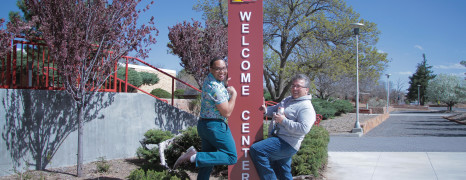
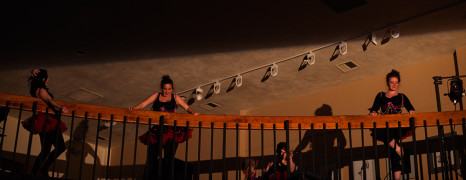
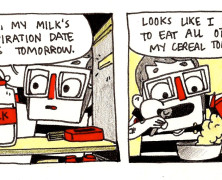

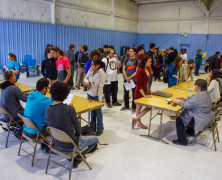
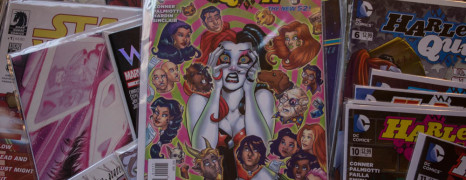
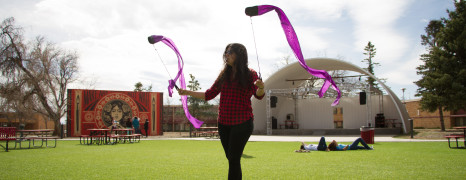
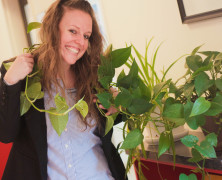


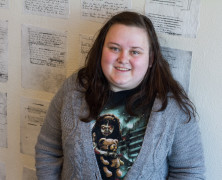

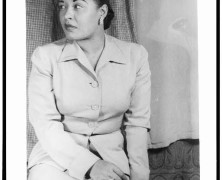
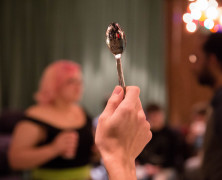
 Jackalope Magazine is the student magazine of Santa Fe University of Art and Design. Building on the interdisciplinary nature of our education, we aim to showcase the talent of our university and character of our city.
Jackalope Magazine is the student magazine of Santa Fe University of Art and Design. Building on the interdisciplinary nature of our education, we aim to showcase the talent of our university and character of our city.